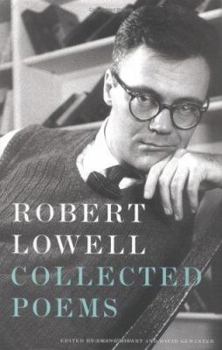Collected Poems
Select Format
Select Condition 
Book Overview
For the first time, the collected poems of America's preeminent postwar poet Edmund Wilson wrote of Robert Lowell that he was the "only recent American poet--if you don't count Eliot--who writes successfully in the language and cadence and rhyme of the resounding English tradition."Frank Bidart and David Gewanter have compiled a definitive edition of Lowell's poems, from the early triumph of "Lord Weary's Castle," winner of the Pulitzer Prize, to...
Format:Hardcover
Language:English
ISBN:0374126178
ISBN13:9780374126179
Release Date:June 2003
Publisher:Farrar Straus Giroux
Length:1248 Pages
Weight:3.96 lbs.
Dimensions:2.4" x 6.4" x 9.5"
Customer Reviews
4 ratings
A Tribute, Not a Review
Published by Thriftbooks.com User , 18 years ago
I studied with Robert Lowell at Harvard in 1963 & 1964. I wouldn't presume to review his Collected Poems, only to testify that he was a giant of a human -- witty, sensitive even toward brash young would-be poets, immensely knowledgeable, immensely conscientious. Having known him remains one of the great privileges of my life. Reading his poems is a great privilege for all of us.
In His Exasperating Wholeness
Published by Thriftbooks.com User , 18 years ago
The publication of this book was doubtless necessary to begin understanding Lowell correctly. Creator and destroyer, careful wordsmith and subversive deconstructor, encountering just one of his volumes along the strange parabola of his career can be confusing. Lowell always set out to carefully craft each of them, with special attention to the arrangement of his resonant poems and their slow, grand, building cumulative effect. To let you know the game, Lowell presented almost each of his volumes with an evocative frontpiece engraving by Francis Parkman -- the poet thus visually setting forth each of his works, in advance of his death, as another controlled chess move against the great opponent Fame -- the act of a control fanatic if there ever was one. Yet somewhere in the middle of Lowell's career of creating the little volumes, more violently toward the end of his years as diseases took over, the mad Doppleganger Cal (Lowell's nickname to his insider pals) enters, seeds the serene clouds with fury, and all hell breaks loose. At worst, all is botched: mere beautiful poetic scraps, a line or two amongst literary gossip for insiders, yesterday's obnoxious news. In hindsight Cal indeed did a pretty good job; it is easier to just turn away from the mess. But Lowell is so good at his best, so earnest even in his madness, that we are going to miss something significant about our own history -- the subject which most deeply concerned him -- if we do. And finally, even at his worst, there is always something very endearing about this voice, something very human and honest. Lowell was plagued with true and furious organic disorders which disrupted his personality; his issues were not only self-inflicted. In an earlier age he would not have lived out the length of career he did; in significant ways, then, his voice is a truly new one on the block. Unfortunately for him, the hyped up madness of his period identified with his genuine madness and made a pathetic celebrity of him, which didn't help the brave and fragile personality struggling to make poetic sense of a disturbed time. Bidart has picked up the pieces and presented Lowell as one, that's all, in all his exasperating wholeness. Now it is easier to see that Lowell and Cal were one, that the lasting work of worth emerges from their furious wrestling. Over time he was many kinds of a writer and a poet, and certainly not all of them will last. He left some absolute foolishness he only got away with because of his name and the looniness at large which seized on him about the same time it seized on Batman and Laugh-In -- junk like the plays in the Old Glory. But when you remember that this was a truly sick man and not just another boozed out writer, you wonder at the absolute clarity of the best work, and the occasional glimmers which never entirely disappeared. Doubtless much later, a generation free of the diseases we still to a degree share with this poet will make the appropriate
A Masterful Collection (and very well-edited)
Published by Thriftbooks.com User , 19 years ago
I believe that Lowell's work is best viewed through this expansive collection. No single book of his poetry truly captures the full breadth of his literary accomplishments. Of course, if you're only looking for an introduction to his work, Life Studies or For the Union Dead would probably do. But if you really want to understand the full scope of his talent, then this book is indispensable. I would even go so far as to say that this book will probably cement Lowell's place among America's finest poets in years to come.
Lowell All Over Again
Published by Thriftbooks.com User , 21 years ago
This is probably the most important collection published in America since Wallace Stevens's 1954 Collected Poems. Although after the publication of Elizabeth Bishop and James Merrill's collected poems Lowell's position no longer seems as pre-eminent as it once did, no poet of his era more intimately captured the uneasy spirit of the Fifties and Sixties. Ginsberg spoke more directly for the disaffected, but Lowell captured the larger unease of America and made it his own, dominating his age as few poets ever have. His voice is unmistakable. His best poems retain their original vitality, and even his weakest poems remain unique in their flaws. Everyone with the slightest interest in poetry will want to own this book.





